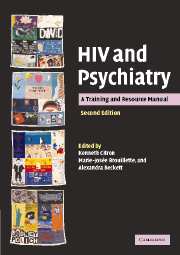Book contents
- Frontmatter
- Contents
- List of contributors
- Preface
- 1 Medical overview
- 2 Cognitive disorders in people living with HIV disease
- 3 General principles of pharmacotherapy for the patient with HIV infection
- 4 Mood disorders and psychosis in HIV
- 5 Suicidal behavior and HIV infection
- 6 Anxiety disorders and HIV disease
- 7 General issues in hospital HIV psychiatry
- 8 HIV and people with serious and persistent mental illness
- 9 Psychotherapy
- 10 HIV and substance use disorders
- 11 Psychiatric issues in pediatric HIV/AIDS
- 12 Uninfected children of parents with HIV
- 13 Psychological issues faced by gay men
- 14 Women and HIV
- 15 Couples
- 16A HIV and cultural diversity
- 16B African Americans
- 16C Latinos and HIV disease
- 16D One heart, two spirit, and beyond: HIV and the people of the First Nations
- 17 HIV in prison populations
- 18 Legal and ethical issues
- 19 Psychiatrist as caregiver
- Appendix I HIV Counselling checklist for physicians
- Index
1 - Medical overview
Published online by Cambridge University Press: 06 August 2009
- Frontmatter
- Contents
- List of contributors
- Preface
- 1 Medical overview
- 2 Cognitive disorders in people living with HIV disease
- 3 General principles of pharmacotherapy for the patient with HIV infection
- 4 Mood disorders and psychosis in HIV
- 5 Suicidal behavior and HIV infection
- 6 Anxiety disorders and HIV disease
- 7 General issues in hospital HIV psychiatry
- 8 HIV and people with serious and persistent mental illness
- 9 Psychotherapy
- 10 HIV and substance use disorders
- 11 Psychiatric issues in pediatric HIV/AIDS
- 12 Uninfected children of parents with HIV
- 13 Psychological issues faced by gay men
- 14 Women and HIV
- 15 Couples
- 16A HIV and cultural diversity
- 16B African Americans
- 16C Latinos and HIV disease
- 16D One heart, two spirit, and beyond: HIV and the people of the First Nations
- 17 HIV in prison populations
- 18 Legal and ethical issues
- 19 Psychiatrist as caregiver
- Appendix I HIV Counselling checklist for physicians
- Index
Summary
Introduction
The first report of acquired immunodeficiency syndrome (AIDS) appeared in the June 5, 1981, edition of Morbidity and Mortality Weekly Report. It described five men who had sex with men (MSM) diagnosed with Pneumocystis carinii pneumonia (PCP). In 1984, researchers reported the discovery of a retrovirus, now known as Human Immunodeficiency Virus, type 1 (HIV-1), associated with AIDS. In 1986, researchers described a second strain, HIV-2, which shares 42% genetic homology with HIV-1 but is less virulent. Based on genetic sequence analysis, scientists have concluded that HIV-1 originated in the African chimpanzee and HIV-2 in the African sooty mangabey.
What is the epidemiology of HIV infection?
World
According to recent estimates, 40 million people worldwide are infected with HIV, and 3 million have died of AIDS in the past year.
Sub-Saharan Africa has been most severely affected, with the highest prevalence in Botswana, South Africa, and Zimbabwe. In Botswana, 36% of the adult population is infected with HIV. By the end of 1999, an estimated 10.7 million African children had lost one or both of their parents to AIDS.
Asia has also been affected by the epidemic. Thailand experienced a dramatic increase in heterosexually acquired HIV cases in the mid-1980s. About 80% of injection drug users (IDUs) in China are HIV seropositive, and the epidemic in the heterosexual population in India is growing rapidly.
In Eastern Europe, injection drug use is the main means of acquiring HIV. Ukraine has reported the majority of cases.
- Type
- Chapter
- Information
- HIV and PsychiatryTraining and Resource Manual, pp. 1 - 29Publisher: Cambridge University PressPrint publication year: 2005
- 1
- Cited by

